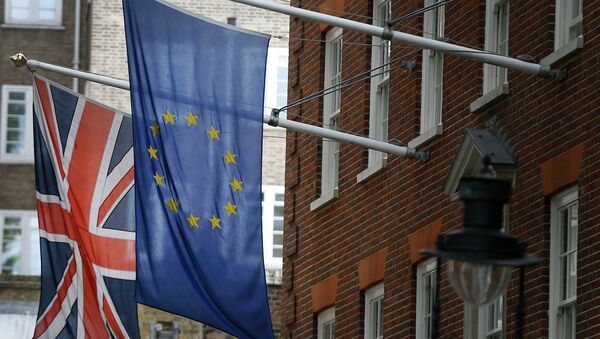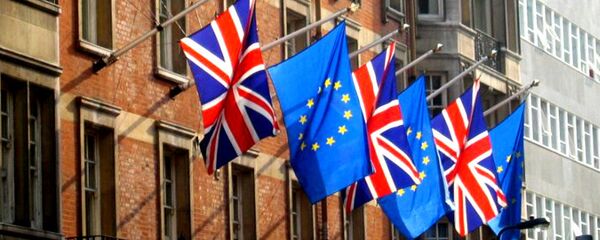On Monday, The Guardian published results of a survey which found that 1,200 EU residents living in the United Kingdom were "in the process of changing nationality or citizenship, or considering doing so" fearing a possible "out" vote in Britain's proposed 2017 EU membership referendum.
According to the survey, EU migrants in the United Kingdom fear the end of fast-track EU-only lines at passport controls, the return of work permits for employees and tighter restrictions on studying and doing business in Britain.
Frightening Possibility
Experts, asked by Sputnik, note that the possibility of a Brexit is making EU residents living in the United Kingdom worried, yet not having a UK passport is unlikely to result in expulsion from the country.
"Not having a UK passport is highly unlikely to result in removal from the country unless the individual has committed a crime or perhaps has been claiming welfare for an extended period of time," Ralph Buckle, director and co-founder of Commonwealth Exchange, told Sputnik.
Buckle noted that uncertainty can cause some EU citizens to voluntarily return home "but these numbers are unlikely to be high enough to see any major economic impact and the effect could be tempered in the short term by welcoming citizens from the Commonwealth and the rest of the world."
Yet Alan Butt Philip, Honorary Reader in European Integration in the School of Management at the University of Bath, claimed that a Brexit could jeopardize the free movement of people – a cornerstone of the European single market, alongside free movement of goods, capital and services.
"Brexit could jeopardize the free movement rights of over two million UK citizens now living in other EU states, and the rights of EU citizens currently living and working in the UK," Butt Philip claimed.
If Britain does walk away from the European Union, experts note that ways would be negotiated to protect UK nationals in the European Union and EU nationals in Great Britain.
"An exit is likely to be negotiated in ways that recognize both the rights of EU citizens living in the UK and UK citizens living in Europe, and the need for the UK government to protect the position of the latter is the best guarantee of the position of the former as reciprocity of rights will almost certainly be a condition of discussions," Helena Wray, an associate professor of law at the Middlesex University told Sputnik.
Wray observed that those EU citizens who do not have permanent residence status in Britain do not have their position in Britain guaranteed, adding that "those with permanent residence will be at a disadvantage if their position after exit is aligned to those of non-EU citizens who have indefinite leave to remain [UK version of permanent residence.]"
Granting UK Passports
Experts do not expect the UK government to assist those entitled to British passports to acquire them, but suggest the process should go hand in hand with the letter of the law.
"The Conservative government is trying to make it harder for EU citizens to come and work in the UK," Butt Philip told Sputnik.
Wray stated that the government is unlikely to change its position on granting naturalization to EU nationals as this would hinder the renegotiation of EU membership terms. She urged the government’s approach to naturalization be as selective as possible within the law.
Buckle suggested that London should not simply hand out passports to any who apply but, someone living in, working in, and contributing to the UK, wishing to become a joint-national, should be permitted to do so.
"However in the future, we must be much fairer to the rest of the world, and especially the Commonwealth, who are currently being squeezed out of UK immigration," Buckle said.
Economic Impact
"Yet there are many people in the UK who dislike the fact that certain decisions are now made by supranational institutions on behalf of UK citizens that they would rather have the UK leave the EU and suffer the economic consequences — significant loss of trade over time, and loss of foreign direct investment — starting with the Japanese carmakers based in the UK," Butt Philip said.
Buckle, on the other hand, suggests that if Britain takes a global view and leaves the EU, it has nothing to fear from a Brexit.
He stressed that the EU's share of global GDP is shrinking, its population is aging, its trade deals take ever longer to complete, and its currency lurches from one shock to another.
"Europe must be a part of Britain’s future but it can’t be all of it. Britain must re-engage with the world and the Commonwealth can be Britain’s route to this new horizon," Buckle said.
Prior to the May 2015 general election, British Prime Minister David Cameron has promised to hold a referendum on EU membership no later than December 2017. In July, British media reported that a vote could take place as early as in June 2016.
Cameron has sought to renegotiate certain terms of the UK's EU membership, particularly in regard to immigration into the United Kingdom from neighboring EU member states.
Other key EU reforms Westminster would like to see include the flexibility to opt-out of further federalization within the bloc, amendments to entitlements for EU migrants, and a more lax approach to enforcing EU legislation by member-state parliaments.





